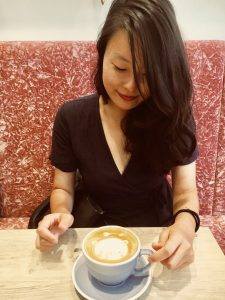
Reverence in the Dark
Contributor’s Marginalia: Jihyun Yun on “Mammoth Cave” by Emma Hine
In the main cavern, an LED-lit sign tells us
about the fish. Down here, in the longest
known cave system, creatures evolved
away from the light, went transluscent,
grew skin back over their eyes…
I am thinking of darkness and the woman whose living room I briefly lived in during graduate school who believed artificial lights caused cancer and used only candles to illuminate her one-bedroom apartment after sundown. Though my first week was filled with groping about and using the walls as guide, like the creatures in Mammoth Cave, I adjusted. So much so that the snatches of morning light filtering through my parted curtains each morning felt strange and assailant. Too tired to pull the sheets over my face, I laid passive and let myself acclimate to ache. I wonder if my few months habituated to that darkness have anything to do with my eyesight’s rapid deterioration. It must have. Every lived moment is a root-cause of some future particular.
…He says,
What are you thinking, and I say, love, as in,
this version of me you love is only
the surface…
…I thought,
maybe this is the reason he leaves me…
Future particulars are like the speaker’s uncertainty in these lines, rooted in the ruthlessness witnessed when the lover drowned mice a winter ago. I think what drew me so intensely to this poem was how it grappled with inaction, how we acclimate to what wounds as a form of preservation, protection, self-care. How much we withhold below our surfaces to face others with what we believe makes us most worthy of love.
The way the quiet holds multitudes.
…That weekend
I saw my grandmother standing in the garage.
Her grieving mouth had broken out
in terrible sores. The metal door had grated shut,
and she was backlit by its dim sliver. And I didn’t
go to her. I stood in the dark and watched.
But the stasis is, as demonstrated in this poem, not only a matter of protecting the self. The speaker, when faced with their Grandmother’s mourning, a grief so intensely private and personal it has physically manifested in sores, they choose to stand by and watch. An action I read as a decision rooted in reverence, a wish to honor how private an act such as grieving can be.
A decade ago, my Grandfather suffered a heart attack and was comatose in the hospital for a week. He would go on to survive his ordeal, but before we knew that, I came downstairs late one night to see my Grandmother hobbling in the kitchen cutting my Grandfather’s favorite type of pear in dim lamplight. She ate it alone, standing over the sink. I am sure this was an act of grief, even though her back was turned to me. I could tell by the slope of her spine, how she chose to not turn the main light on and instead groped around in the dark. I could have gone down to her but didn’t.
The next morning when I told my mother, she asked how I could witness that grief and just stand by and do nothing. I wanted to say, Reverence, but instead said sorry.
So many years later, I have this poem to thank for making my younger self feel, rather than ruthless, understood.
